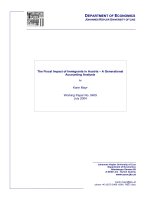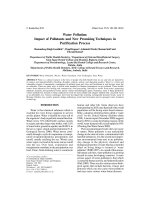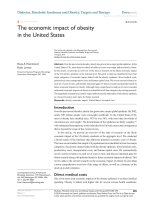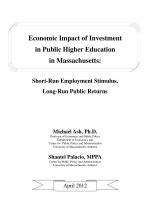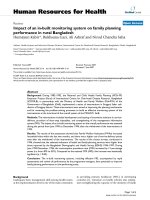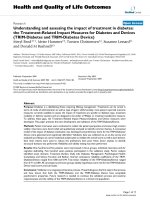The impact of EVFTA in new generation agreement on vietnam’s seafood export to the EU
Bạn đang xem bản rút gọn của tài liệu. Xem và tải ngay bản đầy đủ của tài liệu tại đây (768.26 KB, 91 trang )
ACADEMY OF POLICY AND DEVELOPEMNT
INTERNATION SCHOOL OF ECONOMICS AND
FINANCE
GRADUATION THESIS
Topic: THE IMPACT OF EVFTA IN-NEW
GENERATION AGREEMENT ON VIETNAM’S
SEAFOOD EXPORT TO THE EU
Supervisor: Ph. D Pham Mỹ Hang Phuong
Student: Cung Diep Ly
Student ID: 5083106513
Class: CLC 8.1
Hanoi, 6/2021
i
ACADEMY OF POLICY AND DEVELOPMENT
INTERNATIONAL SCHOOL OF ECONOMICS AND
FINANCE
GRADUATION THESIS
Topic: THE IMPACT OF EVFTA IN-NEW
GENERATION AGREEMENT ON VIETNAM’S
SEAFOOD EXPORT TO THE EU
Supervisor: Ph. D Pham Mỹ Hang Phuong
Student: Cung Diep Ly
Student ID: 5083106513
Class: CLC 8.1
Hanoi, 6/2021
ii
ACKNOWLEDGEMENT
The process of completing a graduation thesis is the most important stage in
every student's life. The graduation thesis is the premise to equip us with research
skills and valuable knowledge before starting a career.
First of all, we would like to sincerely thank the teachers and teachers from
the International Training Institute who dedicatedly taught and equipped me with
the necessary knowledge during my time in the lecture hall. I can finish this thesis.
I would like to thank Dr. Pham My Hang Phuong has directly enthusiastically
helped, oriented the way of thinking and working in science. Those are very
valuable suggestions not only in the process of making this thesis but also a
stepping stone for me in the process of studying and setting up a career later.
And lastly, thank you to family, friends, class team, who are always willing to
share and help in study and life. Hopefully, we will stick together forever.
Thank you sincerely!
iii
TABLE OF CONTENTS
INTRODUCTION...................................................................................................1
1. The significance of the study.............................................................................. 1
2. Research purpose and tasks............................................................................... 2
2.1. Target.................................................................................................................2
2.2. Mission...............................................................................................................3
3. Research scope.....................................................................................................3
3.1. Time................................................................................................................... 3
3.2. Space..................................................................................................................3
4. The methodology................................................................................................. 3
5. Structure of thesis................................................................................................4
CHAPTER 1. OVERVIEW OF EU-VIETNAM TRADE ECONOMIC AND
TRADE RELATIONS FROM 1995 TO NOW.....................................................5
1.1. Overview of EU-Vietnam economic and trade relations.............................. 5
1.1.1. Overview of EU’s market................................................................................5
1.1.2. Overview of the cooperation relationship between Vietnam and the EU.
9
1.2. Vietnam-EU trade relation from 1995 to now............................................. 11
1.2.1. The current situation of Vietnam-EU trade relations in recent years........11
CHAPTER 2. IMPACT OF THE EVFFTA ON SOME GROUP OF
VIETNAMESE EXPORTS TO THE EU............................................................17
2.1. Overview of the EVFTA Agreement............................................................. 17
2.1.1. EVFTA negotiation process......................................................................... 17
iv
2.1.2. The main comitments of EVFTA ...............................................................
1.2. Commitment to opening the goods market of Vietnam ..................................
2.1.3. Assessing the overall impact of EVFTA on Vietnam ..................................
2.2. Overview of Vietnam's seafood industry ......................................................
2.2.1. The concept and classification of aquatic products ....................................
2.2.2.Factors affecting the export of seafood products .........................................
2.2.3. Status of seafood production ........................................................................
2.2.4. Vietnam's seafood export situation ..............................................................
2.2.5. Structure of export products .........................................................................
2.2.6. Export markets and forms of exporting seafood .........................................
2.3. General comments about Vietnam's seafood industry ................................
2.3.1. Strength .........................................................................................................
2.3.2. Weakness .......................................................................................................
2.4. The impact of EVFTA on Vietnam’s seafood exports to the EU ...............
2.4.1. EVFTA's commitments related to Vietnam's seafood exports to the EU ...
2.4.2. Forecasting the prospects and the impact of EVFTA on seafood exports to
the EU ......................................................................................................................
2.5. Some achievements of Vietnam’ seafood export when EVFTA comes into
effect .........................................................................................................................
CHAPTER 3. AIMS AND SOLUTIONS TO IMPROVE EFFICIENCY
TAKING ADVANTAGE OF EVFTA .................................................................
3.1. Fisheries industry development goals to 2020, planning with a vision to
2030..........................................................................................................................
v
3.1.1. Fishery development goals in 2020..............................................................75
3.1.2. Vision 2030................................................................................................... 75
3.2. Solution............................................................................................................76
3.2.1. Group of solutions for authorities related to the fisheries industry...........76
3.2.2. Group of solutions for farming, mining, collecting, processing, exporting
enterprises and fishermen......................................................................................78
CONCLUSION......................................................................................................81
REFERENCES......................................................................................................82
LIST OF FIGURES
Figure 1.1 - The total import and export volumn between Vietnam and EU,
period 2015 - first 10 months of 2020 (Unit: million USD)................................12
Figure 2.1.: Vietnam's aquaculture and fishing output (thousand tons)..........39
Figure 2.2: Summary of seafood export value between Vietnam and EU in the
period 2015-2019................................................................................................... 40
Figure 2.3: Proportion of seafood exports from Vietnam to the EU in the period
2015 -2019; Unit: %.............................................................................................. 42
Figure 2.4: Structure of Vietnam's seafood export market to the EU by
turnover (2015-2019).............................................................................................44
Figure 2.5: Vietnam's seafood exports to the EU in 2019 - 2020.......................69
vi
LIST OF TABLES
Table 1.1 - Value of exports and imports by continent and country in the first
nine months of 2020 and compared to the same period in 2019.......................12
Table 1.2 - Top EU markets Vietnam exported over 1 billion USD in 2019.....13
Table 1.3 - Export structure of some main products of Vietnam to the EU
market in the period of 2017-2019.......................................................................15
Table 2.1 - Summary of EU open-door commitments for some important
commodity groups of Vietnam............................................................................. 19
Table 2.2: Summary of Vietnam’s market access commitments to some
important EU commodity groups........................................................................22
Table 2.4: Tariff reduction roadmap for some key products of Vietnam.........49
Table 2.5: Vietnam's seafood exports to the EU in November and 11 May 2020
71
Table 2.6: Seafood exports to EU markets in November and 11 May 2020.....72
LIST OF BOXES
Box 2.1: A number of EVFTA commitments to open service trading and
investments from Vietnam to the EU...................................................................26
Box 2.2: A number of EVFTA commitments to open Vietnam’s public
procurement market............................................................................................. 28
vii
viii
INTRODUCTION
1. The significance of the study
The EVFTA Agreement officially took effect on August 1, 2020, this is
Vietnam's unremitting efforts after nearly 10 years from the beginning of negotiations
to the official signing. This is a comprehensive, high-quality agreement that balances
the interests of both Vietnam and the EU, and is in line with the provisions of the
World Trade Organization (WTO). Besides, with the strong commitment to open the
market in the EVFTA Agreement, it will definitely contribute to Vietnam's GDP
increase by an average of 2.18-3.25% (in 2019-2023); 4.57-5.30% (2024-2028) and
7.07-7.72% (2029-2033). In terms of exports, the Agreement will promote further
expansion of the market for Vietnamese exports. According to a study by the Ministry
of Planning and Investment, the EVFTA Agreement will help Vietnam's export
turnover to the EU increase by about 20% by 2020; 42.7% in 2025 and 44.37% in
2030 compared to no Agreement. Especially with the commitment to eliminate import
tax up to nearly 100% of the tariff and the trade value that the two sides have agreed,
the opportunity to increase exports for Vietnamese products has advantages,
including: to fisheries - is one of the key industries of the country and plays a
significant role in the Vietnamese economy. This is also one of the potential products
that Vietnam exports to Europe.
In the past time, there have been a number of research projects on EVFTA such
as:
Specializes in EVFTA with Vietnam's trade in the first quarter of 2021 - Textile,
Garment and Footwear Industry, the study focuses on assessing the impact of these
commodity groups when they are expected to have growth after the EVFTA comes
into effect., and actually had a strong impact, recovering Vietnam's exports to the EU
market. The EVFTA Agreement was started to be implemented in the
1
context of complicated developments of the Covid-19 epidemic, especially the EU
is an area heavily affected by the disease. Isolation and blockade measures along
with economic impacts have reduced consumer demand for non-essential goods,
including imported textiles, leather and footwear products. In such a context, the
EVFTA has helped restore the exports of these two industries in the last 5 months
of 2020 and the first 3 months of 2021. There are also some works that go into the
overview analysis of the trade situation. Vietnam - EU trade, policy information,
market information, business information with many reliable data and in-depth
assessments for a number of typical export items such as wood and wood industrial
products., vegetables and fruits can be mentioned such as the Journal: Vietnam EU Trade in the first quarter of 2021, or the Business Manual "EVFTA and
Vietnam's Fruit and Vegetable Industry" which summarizes and explains in detail
and fully the EVFTA commitments. related to the fruit and vegetable industry,
thereby analyzing opportunities and challenges from these commitments and
making specific and practical recommendations for enterprises in the Vietnamese
fruit and vegetable industry.
All of the above studies have assessed the impact and forecasted the impact of
the EVFTA on a number of groups of Vietnamese exports, however, there has been
no follow-up study to analyze the impact of this Agreement on Vietnam's seafood
export. Therefore, the author decided to go into depth and analyze this topic.
2. Research purpose and tasks
2.1. Target
The project is implemented to research impact and propose solutions to help
Vietnam's seafood export industry make effective use of the commitments of the
EVFTA.
2
2.2. Mission
To achieve the above objectives, the topic focuses on solving 3 main tasks:
-
Clarifying trade relations between Vietnam and EU from 1995 to present.
-
Analyze the impact of the EVFTA on Vietnam's seafood exports to the EU.
-
Proposing recommendations and solutions to promote Vietnam's seafood
industry in the context of joining EVFTA
3. Research scope
3.1. Time
Actual data of the seafood industry for analysis related to the impact of the
EVFTA Agreement will be carried out when the Agreement comes into force
3.2. Space
Impact of the EVFTA Agreement on Vietnam's seafood exports to the EU.
4. The methodology
The article applies scientific research methods including: statistical methods,
data collection, analysis and synthesis methods, qualitative methods.
Data collection method: With statistical method, data collection helps to
synthesize economic data of related countries, giving accurate results. Besides, the
data collection method used to collect secondary data from sources such as: books
and newspapers; specialized magazines; Proceedings of scientific conferences;
reports of research institutions; data on websites of enterprises, ministries,
departments, branches, domestic and foreign press agencies.
Analytical and synthetic methods: With the method of statistical analysis and
synthesis, the positive and negative aspects are presented, thereby drawing
conclusions and predictions by analyzing the impact of the EVFTA Agreement on
3
the seafood industry. produce. From there, the topic concludes and recommends
solutions to promote the supply chain in the textile industry in Vietnam.
Qualitative research methods: Consult experts, conduct discussions and
interviews with subjects in the field of expertise, researchers, managers from the
Ministry of Planning and Investment., faculty members from the Academy of
Policy and Development.
5. Structure of thesis
The structure consists of 3 chapters:
Chapter 1: Overview of Vietnam-EU trade relations from 1995 to present
Chapter 2: Impact of the EVFTA on some groups of Vietnamese exports to the
EU
Chapter 3: Some recommendations and solutions to improve the efficiency of
taking advantage of commitments from EVFTA
4
CHAPTER 1. OVERVIEW OF EU-VIETNAM TRADE ECONOMIC AND
TRADE RELATIONS FROM 1995 TO NOW
1.1. Overview of EU-Vietnam economic and trade relations
1.1.1. Overview of EU’s market
The European Union (EU) was born in a rather special situation, it was a
"ruined" Western Europe after World War II (1954) in which the warring country
was the largest country (Germany). Therefore, the main goal of the founders of the
EU was to (i) build peace for the European nations; (ii) eliminate the enmity
between the two largest European countries, located next to each other (Germany
and France); (iii) tightening relations among member countries; and (iv) prevent
conflicts between Europe.
Over the past 60 years, the EU has made great achievements in terms of both
size and level of integration. In terms of scale, from the original 6 founding
countries, up to now, the EU has 28 member countries. The level of economic
integration of the bloc has gradually reached perfection in all five forms: free trade
area, customs union, common market, monetary union and economic union.
Besides, the EU has also achieved many great achievements in a number of other
fields such as: institutional reform and policy making; consolidating the block of
foreign policy and security; strengthen the authority
Up to now, the EU is still considered the most successful association
organization in the world with the development process from economic links to
socio-political links in the form of supranational state institutions, in which uphold
the independent role of member states.
a)
Characteristics of the EU's socio-economic development in the current
period
5
In terms of area: Currently, the EU's land area is 4.48 million km2, accounting
for 3.38% of the whole world. However, there is also a large difference in land area
between countries (the area of the largest country (France) is 1,753 times larger
than that of the smallest country (Malta).
Economic: Currently, the EU is the largest economic union in the world. In
2019, the union's GDP at current exchange rates reached 15,593 billion USD4,
accounting for approximately 20% of the world GDP. However, the income gap
between member countries is relatively large, the GDP of EU15 countries such as
Germany, UK and France is very high, while those of recent entrants (mainly
former Eastern European countries) has a relatively low standard of living.
Population: In 2020, the population of the EU is expected to reach 448
million people. However, the population size of the countries is also quite high.
In terms of living standards of the population: In 2019, the Union's GDP per
capita reached 37,642/person/year. Similar to GDP, people's incomes also have
large differences between countries.
b) Characteristics of the EU market
The EU is one of the biggest partnership of Vietnam’s trade, during the last
years, this region always makes up for a large percentage of Vietnam’s exports.
Vietnam-EU trade cooperation has been established and developed very quickly and
effectively, from 2000 up to now. 2020 marks 30 years since Vietnam and the
European Union (EU) officially established diplomatic relations. During that 30-year
journey, despite the fluctuations of the world situation and the two continents of AsiaEurope, the relationship between Vietnam and the EU has constantly developed,
achieved important steps, and contributed to the development of the EU. a new
milestone in Vietnam's international integration process. The achievements of
6
cooperation between the two sides have been the basis for opening a promising
new chapter of bilateral relations. Specifically:
Scale: Two-way trade in 2019 reached 49.8 billion USD, of which Vietnam
exported 35.8 billion USD. Vietnam's market share is 1.8% and ranks 11th among
the largest exporting countries to the EU. Vietnam's exports to the EU market are
expected to benefit, including: textiles, footwear, agro-forestry-fishery products,
and plastic products.
About the position of the EU market: EU-27 is currently one of the largest
export markets of Vietnam, after the United States and China. For EU-27, Vietnam
is the 17th largest trading partner in the world, the 8th among partners in Asia and
the second largest in ASEAN.
Taste and consumption habits
With the total of 27 members, each country in the EU has its own
consumption features, so EU is viewed as a market that has a diverse and plentiful
demands for goods. Even though, the customs and consumption market are
different in each country, these countries belong to the Western and Northern
Europe. Therefore, they have economic and culture similarity. The level of socioeconomic development of the nations is quite equal, so the people of the EU have
common characteristics in terms of preferences and consumption habits. Imported
goods into this market must be fully guaranteed in terms of quality, origin and
design, with high hygiene and safety. European consumers often have a preference
and habit of using products with world famous brands because they believe that
these well-known brands are associated with product’s quality and have a longstanding reputation, so they use products bearing renowned brands will be very
safe in terms of quality and peace of mind for users.
EU is a difficult market
7
The EU market is a picky market; European people always select carefully.
EU importers and consumers always tend to have high demands on goods imported
from abroad and they are often more cautious and conservative than other key
markets of our country such as the United States and the United States. United
States, ASEAN, China. In addition, the EU's import management policy always
sets forth very strict technical standards on food hygiene and safety, animal and
plant quarantine, good agricultural practices, organic agriculture, etc. organic, ecolabel... to protect consumers and the environment.
The EU is a consumer protection market. Factors related to the safety and
health of consumers are placed on top of this market. To ensure product safety for
consumers, the EU checks products right from the place of production and has an
alarm system among member countries when there is a toxic phenomenon, and
abolishes the inspection of products. at the border. The EU sets up national or
European standard regulations to ban the trade of products manufactured in
countries where production conditions do not reach a level of safety on par with
European standards. In particular, the EU has very strict product labeling
regulations, especially for food, beverages, pharmaceuticals and silk fabrics. In the
system of consumer protection regulations, there are regulations on the ingredients
of the product, how to preserve it. Making improper packaging, packaging,
smuggled products, stealing copyrights, ... are handled very strictly.
Finally, although the value of imports from countries outside the EU always
tends to increase, the EU is really a large and potential market, but penetrating and
standing on this market is not easy, because imported goods are not easy. Exporting
to the EU market is subject to relatively fierce competition pressure due to the
concentration of producers and exporters in the world that are increasingly
interested in this potential and promising market.
8
1.1.2. Overview of the cooperation relationship between Vietnam and the
EU
* Overview
Vietnam and the European Union (EU) officially established diplomatic relations
on November 28, 1990, since then, the relationship between the two sides has entered
the framework, developing rapidly both in breadth and depth. and depth. EU has
become one of the leading important partners of Vietnam in many fields, especially
economy, trade and investment; actively contribute to the process of socio-economic
development and international economic integration of Vietnam.
Since the establishment of diplomatic relations, Vietnam - EU relations have
developed rapidly in both breadth and depth. This dynamic development requires
the establishment of a new cooperation framework for Vietnam - EU relations to
replace the 1995 Vietnam - EC Framework Agreement. In that spirit, in June 2005,
the Prime Minister the Government of Vietnam has approved the Master Plan on
Vietnam - EU relations up to 2010 and orientation to 2015; policy of building
"equal partnership, comprehensive and long-term cooperation between Vietnam
and the European Union for peace and development" and assigned the Ministry of
Foreign Affairs to negotiate and sign the Partnership Agreement and
comprehensive cooperation (PCA) Vietnam - EU.
After a two-year process with nine rounds of negotiations, the PCA Agreement
was signed by both sides in October 2010 and officially signed in June 2012, marking
a new qualitative development of the relationship between Vietnam and the EU. The
PCA Agreement not only regulates bilateral relations between Vietnam and the EU in
such fields as economic development cooperation - trade, education - training, science
- technology, agriculture, health, etc. tourism... but also includes cooperation at
regional and international forums, cooperation to deal with global challenges such as:
climate change, environment, natural disasters, energy security,
9
combating proliferation of weapons of mass destruction, terrorism and organized
crime.
*
The Framework Agreement on Comprehensive Partnership and
Cooperation (PCA) between Vietnam and EU:
Vietnam-EU cooperation has enhanced strongly in recent years, which is set
to keep a new mechanism in order to reflect the strongly developing partnership
and create a new legal framework to replace the 1995 framework agreement.
9 sessions of negotiations were held from June 2008 to October 2010, the PCA
th
was signed on the sidelines of the High-level Summit Asem 8 in Brussels with the
participartion of Prime Minister Nguyen Tan dung and EC President Barroso
On 27th June 2012, in Brussels, PCA was officially signed by the Minister of
Foreign Affairs Pham Binh Minh and EU’s High Representative for Foreign and
Security Policy Catherine Ashton
It cannot be denided that, PCA framework marked an important twist in the
relationship between Vietnam and EU, it also stated that deep and Vietnam-EU’s
comprehensive cooperation during the last 20 years and establishing in a new
phase of intergration
*
The Framework Free Trade Agreement between Viet Nam and EU
Regarding trade, after eight years of negotiations, the European Parliament
ratified the EU-Vietnam Free Trade Agreement (FTA) along with the EU-Vietnam
Investment Protection Agreement (IPA) on December 12. February 2020. After the
positive vote of both the European Parliament and the National Assembly of Vietnam,
the FTA officially took effect from August 1, 2020 (while the IPA also needs the
parliaments of each European country to approve standard). The FTA will help bring
trade and investment relations between the EU and Vietnam to a new level,
eliminating 99% of tariffs between the two sides within 10 years, facilitating
10
access to the Vietnamese market for businesses. EU as well as promoting
sustainable development in areas such as climate change, labor and human rights.
* Dialogue and cooperation mechanism:
The Vietnam – EC Joint Commission (based on the 1995 Framework
Agreement) includes: Working-Group on Trade and Investment; Working group on
Development Cooperation; Sub-committee on Cooperation in the areas of
institution buiding, administrative reform, governance and human rights; Subcommittee on Scientific and Technological Cooperation.
* Cooperation in multilateral and regional forums
At multilateral forum and international organizations, Vietnam and EU always
actively cooperate, particularly in the framework of ASEAN-EU cooperation, ASEM
and UN in many areas. The two sides also work together in responsing global issues
such as climate change, sustainable development, energy security, fighting terrorism,
non - proliferation of weapons of mass destruction, illegal migration, etc.
1.2. Vietnam-EU trade relation from 1995 to now
1.2.1. The current situation of Vietnam-EU trade relations in recent
years Overview of Vietnam's goods exports to the EU
It can not be denided that EU is the region that makes up for a large proportion
of Vietnam’s exports. Trade relations between Vietnam and the EU have formed and
developed increasingly and effectively, from 2000 to now. In 2020, this year marks
th
30
annivesary since Vietnam and the European Union (EU) officially established
diplomatic relations. During 30-year cooperation, despite the fluctuations of the world
situation and the two continents of Asia-Europe, the relationship between Vietnam and
the EU has constantly developed, achieved important steps, and contributed to the
development of the EU. a new milestone in Vietnam's
11
international integration process. The achievements of cooperation between the two
sides have been the basis for opening a promising new chapter of bilateral relations.
Figure 1.1 - The total import and export volumn between Vietnam and EU,
period 2015 - first 10 months of 2020 (Unit: million USD)
Source: General Department of
Customs
Table 1.1 - Value of exports and imports by continent and country in the first
nine months of 2020 and compared to the same period in 2019
Market
Asia
EU
America
Australia
Africa
Total
Source: General Department of Customs
Regarding export market structure: The main exporting countries of
Vietnam in the EU market still focus on traditional markets such as the Netherlands,
Germany, France, Italy, Spain, Belgium and Poland. In which, markets with export
value reaching over 1 billion USD are the Netherlands (6.88 billion USD, decreasing
2.89% when compared to 2018), Germany (6.56 billion USD, going down 4.63%),
France ($3.76 billion, declining 0.01%), Italy ($3.44 billion, increasing 18.46%),
Austria ($3.27 billion, 19.93%), Spain ($2.72 billion, rising 3.38%), Belgium ($2.55
billion, increasing 5.83%), Poland ($1.50 billion, going up 12.42%) and Sweden
(1.18 billion USD), an increase of 2.39%).
Table 1.2 - Top EU markets Vietnam exported over 1 billion USD in 2019
Number
1
2
3
4
5
6
7
8
9
Source: General Department of Customs
In the structure of goods export: The outstanding feature in the import-export
structure between Vietnam and the EU is the great complementarity, less direct
competition due to the strengths and characteristics of the goods. Exports of the
two sides are different, Vietnam has the strength to export all kinds of phones and
components; computers, electronic products and components; textiles, aquatic
products, other machinery, equipment, tools and spare parts, etc. to the EU and EU
to export machinery, equipment, tools and spare parts; medicine; computers,
electronic products and components; chemicals to Vietnam market.
Vietnam mainly exports phones and components (reaching 12.21 billion USD,
decreasing 7.23%), footwear of all kinds (5.03 billion USD, going up 7.51%.),
computers, electronic products and components ($4.66 billion, rising 8.13%), textiles
and garments ($4.26 billion, up 3.90%), machinery, equipment, tools and spare parts
($2.51 billion, increasing 21.63%), seafood products ($1.25 billion, decreasing
13.07%) and coffee ($1.16 billion, going down 14.91%). The items with the highest
growth in 2019 were plastic materials (reaching US$ 19.13 million, up 235.42%),
paper and paper products ($13.94 million, up 175.56). %), cameras, camcorders and
components ($30.70 million, up 139.83%), tea ($8.20 million, up 132.98%) and
electrical wires and cables (31. 10 million USD, up 139.83%. Some export growth
decreased, such as iron and steel of all kinds (US$238.28 million, down 33.98%),
chemicals ($38.35 million, down 16.83%), rubber (113.77) million
14
USD, down 11.37%), seafood (1.25 billion USD, down 13.07%) and coffee (1.16
billion USD, down 14.91%).
Table 1.3 - Export structure of some main products of Vietnam to the EU
market in the period of 2017-2019
Unit: Billion USD
No
Name of product
1
Footwear
2
Textiles
3
Seafood
4
Coffee
5
Woods
6
Computers
7
Phones
8
Bag, wallet, vali, hat, umbrella
9
Products made from steel
10
Means of transport and spare parts
11
Cashew
12
Machines
Source: General Department Customs
Vietnam are suffering from many negative effects from the Covid-19
pandemic, when exporting to the EU. However, via the EVFTA agreement with a
commitment to remove tariffs up to nearly 100% as soon as EVFTA comes into
15
effect, and trade volumn to promote Vietnam - EU trade relations, August 2020 has
marked an important milestone when 3.25 billion USD of Vietnamese goods have
been exported to the EU market (an increase of 300 million USD compared to
July). Continuing the growth momentum of August, export turnover to the market
in September continued to maintain a strong increase with 14.4% over the same
period in 2019.
At the end of September 2020, Vietnamese goods are issued nearly 15,000 sets
of Certificates of Origin (C/O) form EUR.1 with a turnover of nearly 700 million
USD to 28 EU countries. The items that have been granted C/O form EUR.1 are
mainly footwear, seafood products, plastic and plastic products, coffee, textiles, bags,
suitcases, vegetables, rattan and bamboo products., Knit; agricultural; Most of the
import markets are countries with seaports and distribution and transshipment centers
of the EU such as Belgium, Germany, the Netherlands, France...
16
CHAPTER 2. IMPACT OF THE EVFFTA ON SOME GROUP OF
VIETNAMESE EXPORTS TO THE EU
2.1. Overview of the EVFTA Agreement
2.1.1. EVFTA negotiation process
In October 2010, the Prime Minister of Vietnam and the President of the
European Union (EU) agreed to start negotiations on a Free Trade Agreement
between Vietnam and the EU (EVFTA) after the two sides completed technical
works. art.
Following the direction of the two Leaders, Vietnam and the EU officially
announced the start of negotiations for the EVFTA Agreement on June 26, 2012.
After nearly 3 years of negotiations, with 14 official sessions and many sessions
between Periodically at the ministerial level, the delegation head and technical
groups, Vietnam and the EU have reached an agreement in principle on all the
basic contents of the Agreement. However, it was not until June 30, 2019, that the
two countries officially signed the EVFTA, and the Agreement took effect from
August 1, 2020.
2.1.2. The main comitments of EVFTA
As well as CPTPP, EVFTA is also a new-generation agreement, which is a
wide and high level of commitments. The Agreement consists of 17 Chapters, 2
Protocols. Key areas of commitment in EVFTA consist of:
Exporting goods between two sides
+
general terms (called written commitments); and
+
specific tariff schedules (called market access commitments)
Rules of origin, including:
17
